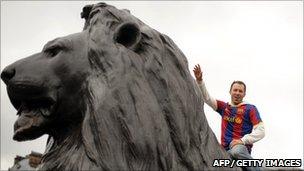Ban tourists from Trafalgar Square lions, says report
- Published

A football fan sits on a lion statue in Trafalgar Square
Tourists should be banned from climbing on Trafalgar Square's lion sculptures to protect them from being damaged, a report has suggested.
The recommendation was made by consultants conducting surveys for the Greater London Authority (GLA), which takes responsibility for the monuments.
It concluded that tourists had damaged the 144-year-old lions and this damage would worsen without intervention.
English Heritage is against a ban and said it would prove "deeply unpopular".
The report said inspections had found the bronze sculptures were in good condition, but it stated: "The lions have suffered severely as a result of the public climbing on and off."
It said cracks had been found in the tail of one lion and all four sculptures had "deep scratches running down their backs".
Inspections also found they were rusting badly and warned parts of the sculptures could fall off, although this was unlikely.
"The state of current damage, (incurred over many years) is permanent and will inevitably worsen without intervention," the report said.
'Spontaneous response'
The report said the GLA could continue to allow visitors to climb on the lions but with "near certainty" of future damage, partially restrict access allowing visitors to climb on the bases, or totally restrict access by putting up signs and creating boundaries around the lions.
Both a partial and total ban would be enforceable by heritage wardens and supported by police, the report said.
English Heritage said part of the value of the lions was their accessibility and the "spontaneous response" of the public who climb and pose on them.
Wear and tear could be regarded as evidence of the way in which the lions were used by the public, it said.
A spokeswoman said: "Restricting access to the lions would be difficult to achieve and maintain, costly and deeply unpopular.
"We recommend the monitoring and management of the lions continues."
A spokeswoman for the Mayor's office, which is responsible for the management of Trafalgar Square, said the report was part of the development of a 10-year plan to conserve the area.
The assessment will not be complete until later in the summer and any ban would be subject to a consultation and a change in local laws, the spokeswoman said.
Any consultation would include English Heritage, Westminster Council, police and the Department of Culture, Media and Sport.
- Published20 June 2011
- Published5 June 2011
- Published20 March 2011